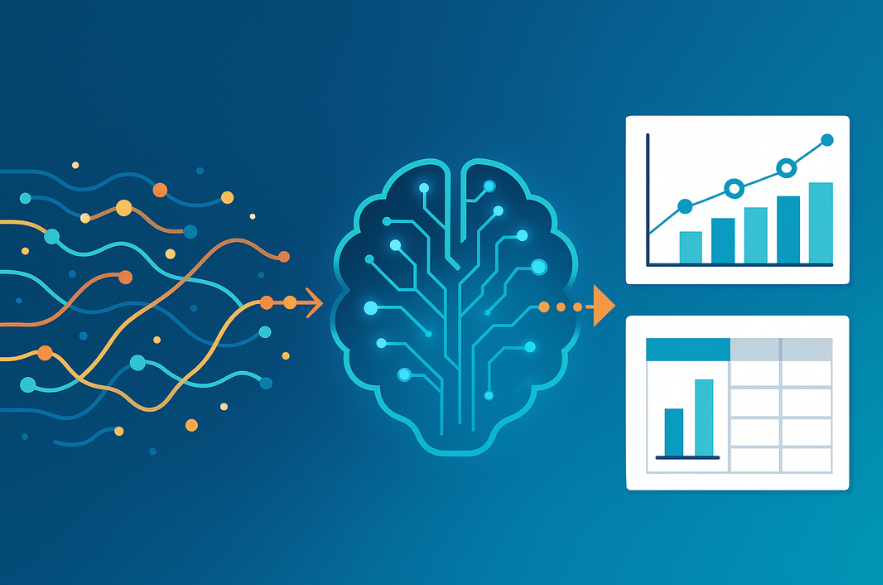Artificial Intelligence (AI) and Machine Learning (ML) models are everywhere today, powering everything from personalized shopping to fraud detection. But while businesses often rush to adopt the latest AI tools, they sometimes overlook the most critical factor behind success: data quality.
The truth is simple garbage in, garbage out. No matter how advanced an AI model may be, if the input data is inaccurate, incomplete, or inconsistent, the output will be flawed. That’s why clean data drives better business decisions and often matters more than the AI models themselves.
Why Data Quality Matters More Than AI Models
Enterprises and SMBs alike are learning that data quality is the foundation of reliable AI systems. A perfectly trained model fed with poor-quality data can produce misleading insights, increase bias, and erode customer trust.
Think about predictive analytics: if historical data is riddled with duplicates, errors, or missing fields, the model’s predictions will not align with reality. This leads to costly missteps in decision-making.
In contrast, businesses that prioritize data integrity, accuracy, and consistency see better outcomes, even with relatively simple models.
The Impact of Data Quality on Machine Learning Performance
How does data quality affect machine learning? In practical terms, clean, well-structured data leads to:
- Higher model accuracy – AI models can only recognize patterns if the input data is reliable.
- Reduced bias – Balanced, representative data minimizes unfair outcomes.
- Faster training times – Clean data requires less pre-processing, cutting costs.
- Stronger compliance – High-quality data ensures adherence to standards like GDPR.
Studies show that up to 80% of data science project time is spent on data preparation, underscoring how critical it is compared to algorithm tweaking.
Clean Data = Better Business Decisions
The role of data quality in business decision-making is undeniable. Small errors in customer records, product catalogue, or financial reports can snowball into large-scale losses.
For example:
- In e-commerce, clean data means accurate product recommendations and fewer cart abandonments.
- In finance, trustworthy data prevents compliance fines and fraudulent activity.
- In healthcare, accurate records ensure patient safety and reliable AI diagnoses.
In each case, the business value of clean data exceeds the appeal of building complex AI models without a strong foundation.
Key Dimensions of Data Quality
To understand why data quality matters more than AI models, let’s look at the core dimensions businesses must manage:
- Accuracy – Data should correctly represent real-world values.
- Completeness – Missing values or partial records weaken model output.
- Consistency – Data should remain uniform across systems and formats.
- Timeliness – Outdated data can distort predictive analytics.
- Integrity – Relationships within the data (e.g., customer ID to transaction) must remain intact.
By investing in data cleansing and governance practices, companies set the stage for AI models that truly add value.
Practical Steps to Improve Data Quality for AI
Businesses often ask: how can we improve data quality to get better AI results? Here are proven steps:
- Data Profiling – Regularly audit datasets for errors, duplicates, or anomalies.
- Data Cleansing – Apply automated tools to correct inconsistencies.
- Data Governance – Create rules and accountability for data entry and maintenance.
- Real-Time Monitoring – Use tools that continuously assess quality during operations.
- Employee Training – Ensure staff understand the importance of clean data practices.
By implementing these, companies can ensure that machine learning data quality frameworks stay strong, scalable, and reliable.
Why Clean Data Is a Competitive Advantage
In competitive markets, businesses with clean data strategies can:
- Launch products faster (because models don’t need excessive debugging).
- Personalize marketing campaigns with greater accuracy.
- Reduce operational costs tied to error correction.
- Build customer trust through consistent, reliable experiences.
Enterprises that invest in data quality best practices see measurable ROI, not just in AI accuracy but in overall decision-making speed and confidence.
Clean Data Over Flashy Models
While AI models attract attention, their success relies heavily on the quality of the data feeding them. For businesses, this means that improving data quality is not just a technical necessity but a strategic advantage.
Clean data leads to better decisions, fewer errors, and more trustworthy AI. In many cases, improving your datasets delivers more business value than upgrading to the latest machine learning model.
At I-NET Software Solutions, we help businesses implement robust data governance, data cleansing, and automation solutions, ensuring your AI projects are powered by reliable data. Book a free consultation to learn how we can help you achieve smarter, data-driven decisions.
Want to see how data is transforming organizations? Read our related blog: How Generative AI Is Delivering Measurable ROI in Real Business Use Cases.
